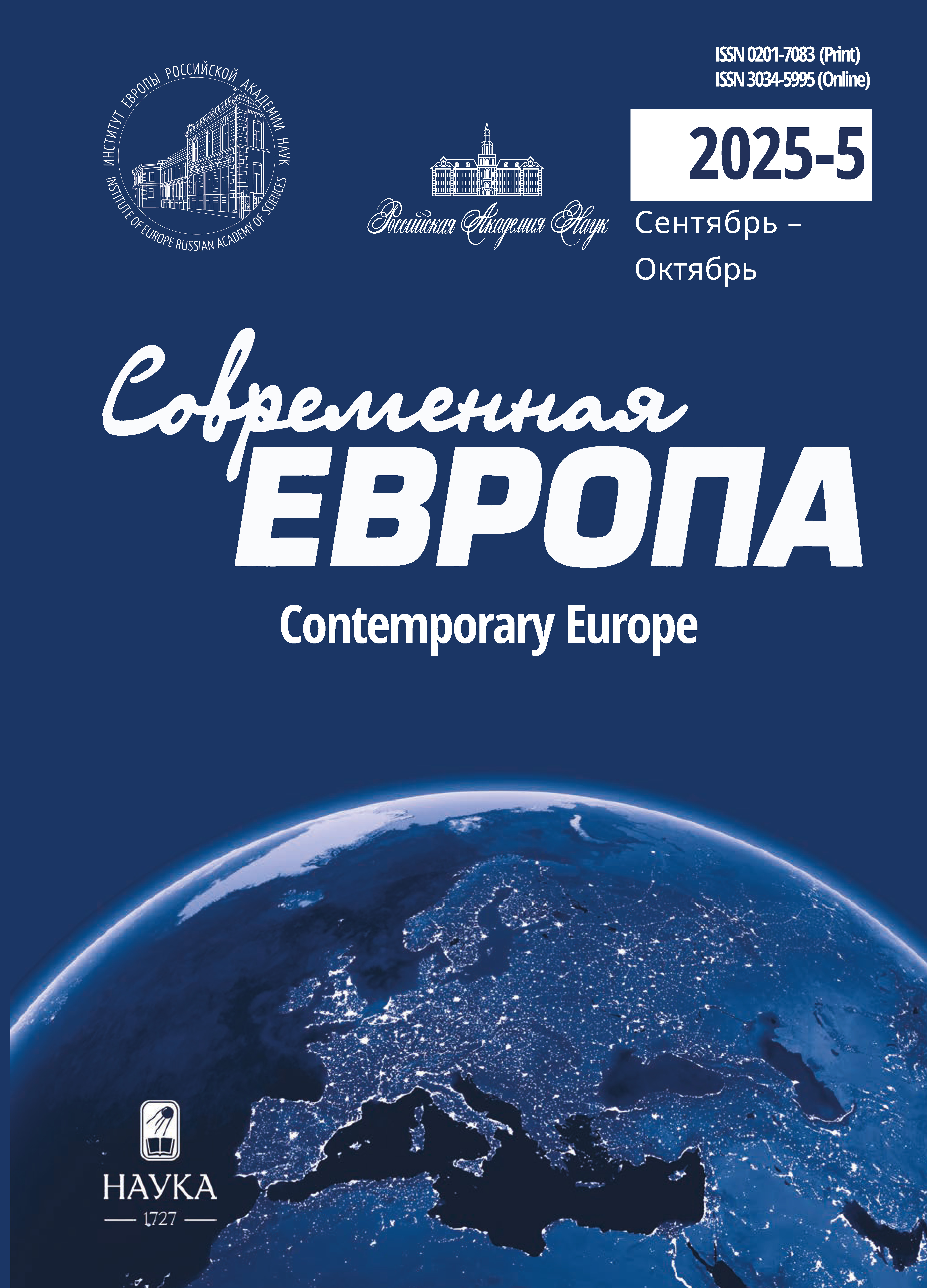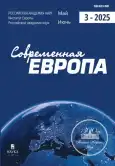БОЛОНСКИЙ ПРОЦЕСС И РЕСПУБЛИКА БЕЛАРУСЬ: ЦЕЛИ, СЛОЖНОСТИ И РЕЗУЛЬТАТЫ
- Авторы: Погорельская А.М1
-
Учреждения:
- Национальный исследовательский Томский государственный университет
- Выпуск: № 3 (131) (2025)
- Страницы: 147-158
- Раздел: ОБРАЗОВАТЕЛЬНОЕ СОТРУДНИЧЕСТВО
- URL: https://vestnik.nvsu.ru/0201-7083/article/view/689115
- DOI: https://doi.org/10.31857/S020170832503012X
- ID: 689115
Цитировать
Полный текст
Аннотация
Статья посвящена анализу целеполагания, сложностей и результатов реализации Болонских принципов в Республике Беларусь. Исследование призвано выявить, каковы были цели, поставленные ею при принятии решения о присоединении к Болонскому процессу, насколько трудности Беларуси были типичны для стран-участниц ЕПВО; каковы оказались результаты развития Болонского процесса для страны по сравнению с поставленными при присоединении к нему целями. Акцент сделан на политической стороне участия РБ в Болонском процессе, внешнеполитическом целеполагании страны в этом проекте, влиянии политических факторов на степень внедрения Болонских принципов и приостановку участия в ЕПВО. Сделан вывод, что вступление в ЕПВО соответствовало внешнеполитическим и внешнеэкономическим ориентирам Минска, а также преследовало академические цели. Беларусь испытывала типичные для новичков в ЕПВО трудности, на которых дополнительно сказывалось стремление сочетать Болонские реформы с преемственностью в системе образования и многовекторностью образовательного сотрудничества. За период участия в Болонском процессе стране удалось нарастить экспорт образования, отчасти привести национальную систему высшего образования в соответствие европейским практикам и обеспечить интеграцию в мировое образовательное пространство. Изменение характера ЕПВО сделало невозможной дальнейшую реализацию белорусских целей в данном формате. В результате сложившейся международной обстановки, стоит ожидать укрепления образовательного сотрудничества Беларуси не только с Россией, но и иными государствами СНГ, Китаем и, возможно, странами глобального Юга.
Ключевые слова
Об авторах
А. М Погорельская
Национальный исследовательский Томский государственный университет
Email: pogorelskaya@mail.tsu.ru
Кандидат исторических наук, доцент кафедры мировой политики Россия, Томск
Список литературы
- Байденко В.И. (2018) Болонский процесс: в преддверии третьего десятилетия. Высшее образование в России. Т. 27. № 11. С. 136–148. doi: 10.31992/0869-3617-2018-27-11-136-148
- Baidenko V.I. (2018) Bolonskij process: v preddverii tret'ego desyatiletiya [Bologna Process: At the Threshold of the Third Decade]. Vysshee Obrazovanie v Rossii, 27(11), pp. 136–148. doi: 10.31992/0869-3617-2018-27-11-136-148 (In Russian).
- Водопьянова Е.В. (2020) Итоги постсоветской трансформации высшей школы. Современная Европа. № 5. С. 132–141. doi: 10.15211/soveurope52020132141
- Vodopianova E. (2020) Itogi postsovetskoj transformacii vysshej shkoly [Results of the PostSoviet Transformation of Higher Education]. Sovremennaya Evropa, 5, pp. 132–141. doi: 10.15211/soveurope52020132141 (In Russian).
- Гущин А.В. (2023) Основные векторы развития российско-белорусского сотрудничества в области образования на современном этапе. Постсоветские исследования. Т. 6. № 2. С. 195‒204.
- Gushchin A.V. (2023) Osnovnye vektory razvitiya rossijsko-belorusskogo sotrudnichestva v oblasti obrazovaniya na sovremennom etape [The main vectors of the development of higher education in Belarus and Russian-Belarusian cooperation in the field of education at the present stage]. Postsovetskie issledovaniy, 2(6), pp. 195–204. (In Russian).
- Жук А.И. (2010) Высшее образование Республики Беларусь: от Болонского процесса к Европейскому пространству высшего образования. Вышэйшая школа. № 5. С. 3–9.
- Zhuk A.I. (2010) Vysshee obrazovanie Respubliki Belarus': ot Bolonskogo protsessa k Evropeiskomu prostranstvu vysshego obrazovaniya [Higher Education of the Republic of Belarus: from the Bologna Process to the European Higher Education Area]. Vysheishaya shkola, 5, pp. 3–9 (In Russian).
- Лебедева М.М. (2017) Международно-политические процессы интеграции образования. Интеграция образования. Т. 21. № 3. С. 385‒394. doi: 10.15507/19919468.088.021.201703.385-394
- Lebedeva M.M. (2017) Mezhdunarodno-politicheskie processy integracii obrazovaniya [International political processes of integration of education]. Integratsiya obrazovaniya, 21(3), pp. 385‒394. doi: 10.15507/1991-9468.088.021.201703.385-394 (In Russian).
- Лескина Н. (2021) Европейский регионализм в сфере высшего образования: от Болонского процесса к Сорбонскому. Современная Европа. № 2. С. 158–166. doi: 10.15211/soveurope22021158166
- Leskina N. (2021) Evropejskij regionalizm v sfere vysshego obrazovaniya: ot Bolonskogo processa k Sorbonskomu [Higher Education Regionalism in Europe: from Bologna Process to Sorbonne]. Sovremennaya Evropa, 2, pp. 158–166. doi: 10.15211/soveurope22021158166 (In Russian).
- Макаров А.В. (2015) Болонский процесс: Европейское пространство высшего образования. Минск: РИВШ. 260 с.
- Makarov A.V. (2015) Bolonskii protsess: Evropeiskoe prostranstvo vyshego obrazovaniya [Bologna process: the European Higher Education Area]. Minsk, RIVSH. (In Russian).
- Титаренко Л.Г., Заславская М.И. (2019) Европейская интеграция систем высшего образования Республики Беларусь и Республики Армения. Журнал Белорусского государственного университета. Социология. № 1. С. 102–112.
- Titarenko L.G., Zaslavskaya M.I. (2019) Evropejskaya integraciya sistem vysshego obrazovaniya Respubliki Belarus' i Respubliki Armeniya [European Integration of the Systems of Higher Education of Belarus and Armenia], Journal of the Belarusian State University. Sociology, 1, pp. 102–112 (In Russian).
- Титаренко Л.Г., Заславская М.И. (2020) Болонский процесс в Армении и Беларуси: успехи и проблемы. Высшее образование в России. Т. 29. № 4. С. 136–145. doi: 10.31992/0869-3617-2020-29-4-136-145
- Titarenko, L.G., Zaslavskaya, M.I. (2020). Bolonskij process v Armenii i Belarusi: uspekhi i problemy [Bologna Process in Armenia and Belarus: Successes and Problems], Vysshee obrazovanie v Rossii, 29(4), pp. 136–145. doi: 10.31992/0869-3617-2020-29-4-136-145 (In Russian).
- Dang Q.A. (2018) Unintended Outcomes of the EHEA and ASEAN: Peripheral Members and Their Façade conformity. European Higher Education Area: The Impact of Past and Future Policies.
- Ed. by A. Curaj, L. Deca, R. Pricopie. Springer, Cham, Switzerland. P. 401–420. doi: 10.1007/978-3-319-77407-7_25
- De Wit H. (2002) Internationalization of Higher Education in the United States of America and Europe. A Historical, Comparative, and Conceptual Analysis. Westport: Greenwood Press. 270 p.
- Gille-Belova O. (2015) Beyond the limits of the European Higher Education Area: the case of Belarus. European Journal of Higher Education. Vol. 5. Is. 1. P. 83–59. doi: 10.1080/21568235.2014.979848
- Huisman J., Smolentseva O., Froumin I. (ed.) (2018) 25 Years of Transformation of Higher Education Systems in Post-Soviet Countries: Reform and Continuity. Palgrave Macmillan, Cham, Switzerland. 482 p. doi: 10.1007/978-3-319-52980-6
- Kushnir I., Yazgan N. (2024) Shifting geopolitics of the European higher education space. European Journal of Higher Education. doi: 10.1080/21568235.2024.2398742
- Lodhi I., Ilyassova-Schoenfeld A. (2023) The Bologna process and its impact on the higher education reforms in Kazakhstan: a case of policy transfer and translations. Studies in Higher Education. Vol. 48. Is. 1. P. 204–219. doi: 10.1080/03075079.2022.2124244
- Moscovitz H., Zahavi H. (2019) The Bologna Process as a foreign policy endeavour: motivations and reactions to the externalisation of European higher education. European Journal of Higher Education. Vol. 9. Is. 1. P. 7–22. doi: 10.1080/21568235.2018.1561316
- Robertson S.L., Keeling R. (2008) Stirring the Lions: Strategy and Tactics in Global Higher Education. Globalisation, Societies and Education. Vol. 6 (3). P. 221–240. doi: 10.1080/14767720802343316
- Zgaga P. (2009) The Bologna Process and its role for transition countries. Revista de la Educación Superior. Vol. XXXVIII (2). No. 150. P. 83–96.
Дополнительные файлы








